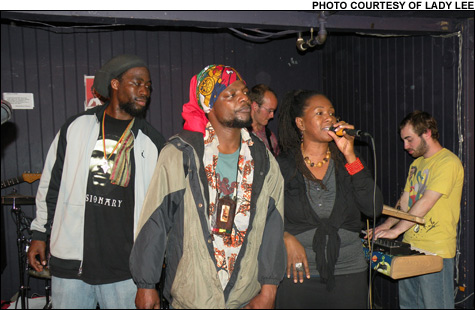In 1981, before Simon stepped away, he and Davis shared an historic moment with legendary Wailer Peter Tosh at the Holiday Inn on Memorial Drive in Cambridge, where Simon snapped a picture of the counterculture hero roasting a spliff on his unicycle in the hallway. That night, Simon and Davis were partying with Doug Herzog, an Emerson College junior who was interviewing Tosh for Strictly Rockers (now simply known as Rockers), which Herzog introduced on WERS as a sophomore in 1979. It remains the longest continually running college-radio reggae show.
Herzog, who three decades later is the president of MTV Networks Entertainment Group, was a New Jersey–raised reggae junkie with a self-described "Jew 'fro" who wasn't afraid to venture into Mattapan to buy eclectic LPs. Despite becoming one of the most powerful visionaries in modern television — and having been responsible for cultivating such programs as The Real World and The Daily Show — Herzog has not forgotten his roots.
"I've been waiting 30 years for this interview," says Herzog. "I started at [WERS] at a show called Listen Here, on which we'd read articles out of the Globe for the blind. Then, when I got to do what I wanted, I got a reggae show on Sunday afternoons, then on Saturday nights, then [with its current five-day format in 1980]. Of all the things I've done, Rockers is what I'm most proud of. All of these shows on MTV and Comedy Central have a lot of fathers — this one was all mine."
There are far too many important college deejays to name here, as, thanks to graduations, Rockers rotates hosts every four years, aging out several loved student selectors like Rudeboy Lincoln, Joshua B, and G-Smith. Other college-radio shows within 100 miles have featured non- student deejays, including Magnus Johnstone — who was also the first jockey to spin a dedicated rap show in Boston — at WMBR (MIT); Robin, who now handles the 20-years-and-still-kicking Ragamuffin International on WZBC (Boston College); Generoso Fierro at the Bovine Ska and Rocksteady on WMBR; and Glendale Reid, who selects the throwback spread at WRBB (Northeastern). (All but Johnstone's are still on air in Boston.) Perhaps most renowned — at least in overall retrospect — has been Junior Rodigan, who has had sets on WTBU (Boston University) and half a dozen other frequencies, leading up to his current drive-time show on the pirate Big City 101.3.
Originally a producer and vocalist, the Iranian-born, London-raised Rodigan has been the city's chief reggae tastemaker since the late 1980s. Aside from radio, he also owned the Vibes Records retail store in Dorchester from 1993 to 2006, and an independent imprint, Mastermind Records, which, in 1995, dropped "Walk Like a Gangsta" by Ruffa (who went on to be the only Caribbean artist from Boston to sign a major-label deal). Rodigan has seen the reggae landscape shift, beloved venues fold, and expected sellouts inexplicably flop. During droughts — when clubs and record stores go out of business — he says it's been the responsibility of deejays to keep a perpetual lifeline between Boston and the pulse of reggae.
"These stations have not only been instrumental in keeping Caribbean music alive in Boston," says Rodigan about off-frequencies like the now-defunct Choice 102.9 FM. "They're also the reason that someone with just a few hits gets heard enough that they can come to town and pack a show." Adds Lady Lee, who hosts a weekly Sunday hour called the Lion's Den on Vibe 105.3 FM: "The scene is very alive here — you can always hear the music no matter what time it is and where you are."

Last month, Toussaint and Ajahni joined forces with Lady Lee at the Western Front in Cambridge. Lee — Boston’s only prominent female reggae “toaster” — says the local scene is still “very alive.” |
Front and center
One major factor in Boston reggae's iron legacy is the Western Front — which opened outside of Central Square in 1968, and which began hosting regular shows around 1971. Currently home to nights like "Fiya Fridays" and live roots and "soca Saturdays," the Front has been a long-time Hub sanctuary for visiting acts like Colorado's Cool Runnings and such local heroes as the I-Tones and Zion Initiation — even though it's had its own troubles. Today, it stands as the only local venue to survive long after an infamous tragedy, when, in February 1987, two men were shot (and one was killed) during a concert. The rest of the troubled clubs folded or switched gears after just a few months.
"It has been consistent, because we change with the audience that's out there," says lifelong Western Front owner Marvin Gilmore (whose son, David, teaches guitar at Berklee). He must be doing something right — there have been no problems for more than two decades, and operations on Western Avenue appear to be business as usual. "I like reggae because it brings peace, and because anybody can dance to it," adds Gilmore. "We have maintained that vibe and that blend here for that long, and we have done it quietly — with no publicist or anything."